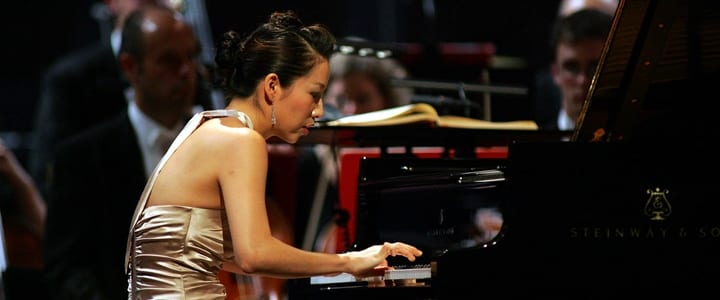 What do the best piano players have in common? Most of them have participated in piano competitions, exams (like the ABRSM), or recitals. Here, St. Augustine, FL teacher Heather L. explores the benefits of piano competitions…
What do the best piano players have in common? Most of them have participated in piano competitions, exams (like the ABRSM), or recitals. Here, St. Augustine, FL teacher Heather L. explores the benefits of piano competitions…
Competition of all kinds gets a bad rap nowadays. In dozens of counties and hundreds of schools across the country, competitiveness is under fire. Students and young athletes are being told that participation and team building are all that counts, and therefore, game scores are not kept. And in even more places, music competitions have become music festivals, in which groups or soloists are graded individually and places like first, second, and third are not given.
Well, in my opinion, competition is what often drives humans to succeed. This is especially true when it comes to musicians, and more specifically, to pianists. Here’s a list of ways that competing makes you a better piano player.
• Pressure to practice
Perhaps the most immediate benefit of piano competitions is not necessarily the pressure to perform, but the pressure to practice. To have a clear and concrete deadline in front of you is quite motivating when it comes to practicing toward that goal.
Knowing that strangers will be looking for both the good and the bad of your art is a whole lot better than being told simply to practice in order to improve in a general way.
• Performance experience
Getting up in front of an audience to speak is one of the most widely feared activities in the world, and that’s only speaking! So getting up in front of an audience to play the piano is even more special, and playing your very best in a competition setting takes the experience to the next level. Performing before judges is nerve-wracking, but very exciting. And honestly, after a competition, a simple recital will feel like a breeze.
• Self-assurance
You have to be self-assured in order to be willing even to enter a competition, and your self-assurance builds as you continue to compete, no matter what the outcome. This helps you to be the kind of pianist who walks into almost any musical situation and says, “Sure, I can do that.”
That kind of attitude can open up the world to you, presenting opportunities that you may never have dreamed of, because you’re saying yes to experiences a less-assured person may have said no to.
• Networking
Networking is typically used as a business term, but it’s also used in the music world. Meeting other musicians and judges and building acquaintanceships at competitions can make a big difference in your piano career, even if you don’t necessarily plan on pursuing it professionally. Making a friend at an event may mean being asked to be part of a festival or being referred for a great gig, or maybe just finding a group of musicians to jam with.
In the end, piano competitions are less about becoming better than other pianists and more about becoming a better pianist yourself. Improving your personal best is the name of the game. That doesn’t mean, though, that the success of others should be ignored. The only great thing about our jealousies is that they can indicate what our desires are. Allow others’ successes and failures to motivate you on your own journey.
 Heather L. teaches singing, piano, acting, and more in St. Augustine, FL, as well as through online lessons. She is a graduate of the prestigious Westminster Choir College in Princeton, New Jersey, and has performed with the New York and Royal Philharmonics, the New Jersey and Virginia Symphonies, the American Boy Choir, and the internationally renowned opera star Andrea Bocelli. Learn more about Heather here!
Heather L. teaches singing, piano, acting, and more in St. Augustine, FL, as well as through online lessons. She is a graduate of the prestigious Westminster Choir College in Princeton, New Jersey, and has performed with the New York and Royal Philharmonics, the New Jersey and Virginia Symphonies, the American Boy Choir, and the internationally renowned opera star Andrea Bocelli. Learn more about Heather here!Photo by Leeds Piano Competition 2015
Suzy S.

